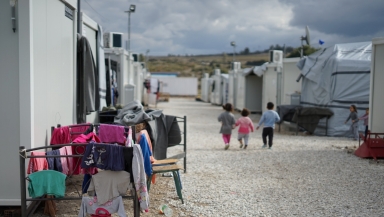
Refugees, by definition, need refuge. And my family is the ever-grateful recipient of just such generosity. In my case, my Jewish great grandparents fled from Tsarist-backed pogroms and state-sponsored antisemitism and settled in Glasgow in around 1892.
In my wife's case, when Stalin's army invaded Karelia in southern Finland, her parents and grandparents fled with just a few clothes, a few photos, and their big family Bible to take refuge far away in the homes of strangers – and start again.
In our day, the number of refugees is staggering – 12 million Syrians alone. We may not be able to welcome them all. But surely we should want to welcome as many as we can, rather than looking back with regret as a nation, a church, or individuals.
A few years ago, I had the honour of officiating at the funeral of a Jewish man who, as a child in Berlin, was ushered by his mother onto a train full of children heading for refuge in England. It's a bittersweet tale. He flourished, but he never saw his mother again.
Before war broke out, thousands of Jews were turned away by this country and others, and subsequently died. At that time, the numbers requesting entry would have been manageable. But the political will was not there.
The Bible is full of commands to care for those in need – the widow, the orphan, the foreigner – and full too of reminders that the people of God were once refugees themselves. Indeed, after the Exodus, God commands his people not to 'despise an Egyptian, because you resided as foreigners in their country.' (Deuteronomy 23:7)
Yes, one particular Pharaoh had treated God's people appallingly. But when there was a famine in the land, the Egyptians welcomed Jacob and his sons, gave them land, and allowed them to flourish in freedom and grow in number for the best part of 400 years.
The people of God had something to be grateful for. As indeed, did Joseph, Mary, and Jesus when they fled Herod's swords and took refuge in Egypt. And, of course, the God of grace wants more for the foreigner, the orphan, and the widow than mere survival.
Deuteronomy 26:12 paints this beautiful picture:
'When you have finished setting aside a tenth of all your produce in the third year, the year of the tithe, you shall give it to the Levite, the foreigner, the fatherless and the widow, so that they may eat in your towns and be satisfied.'
The foreigner has the same status here as the Levite, and God's desire is that they should 'eat and be satisfied.' From fruit in the garden to bread in the upper room to the wedding banquet of the lamb, it is ever thus.
May it be so in our land.
Mark Greene is Mission Champion at the LICC (London Institute for Contemporary Christianity).













